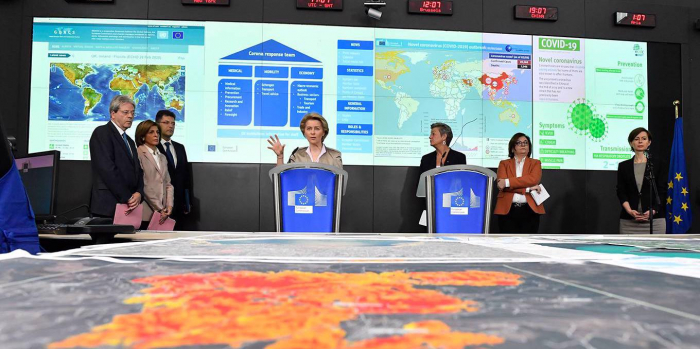The European Union has always advanced on the back of crises. In this sense, the COVID-19 outbreak could represent a chance for the EU to create a powerful crisis-management mechanism, which pools members’ resources and channels them toward a coordinated fiscal policy.
For years, fears have been mounting that a “black swan” would test the European Union’s crisis-management capabilities. With the outbreak of the COVID-19 coronavirus, those fears have come to pass – and it is not at all clear that the EU will be able to withstand it.
The COVID-19 epidemic is not just any stress test. For starters, it is likely to affect the entire world, leading to a synchronized growth slowdown or even recession. Synchronized recessions are virtually always deeper and longer-lasting than downturns affecting individual economies, and they hit open economies like the EU particularly hard.
Compounding the problem, because every EU member state is facing a severe shock, they will be far less able to help one another than they were during the eurozone crisis that began in 2010. To be sure, Italy has suffered the most so far. But past transmission patterns elsewhere suggest that COVID-19 will continue to spread across Europe, putting every country under growing strain.
Of course, it is impossible to say precisely how the epidemic will unfold. But that uncertainty will only exacerbate the economic fallout, because it will undermine investment and household consumption.
Already, the virus has disrupted supply chains and slowed global trade, with predictably negative effects on corporate revenues and employment. The tourism and transport sectors have been hit particularly hard, owing not only to government-mandated travel restrictions, but also to voluntary “social distancing” and reductions in movement. As a result, overall demand is already declining, reflected in plummeting oil prices – typically a harbinger of global recession.
To be sure, the consequences of a negative shock like COVID-19, however painful, could be short-lived. But while China seems to have brought new infections under control, the number of cases continues to rise elsewhere. Unless this changes soon, the economic effects are unlikely to be temporary.
A more probable scenario is that the COVID-19 shock will test the resilience of public-health systems, labor relations, and formal and informal solidarity mechanisms across the EU. And if the pandemic is not confronted with an aggressive and timely policy response, its effects are likely to be long-lasting, especially if amplification mechanisms are activated.
Such mechanisms typically work through the financial sector. The good news is that, thanks to improved regulation, banks are better capitalized than they were in 2008, when the last global financial crisis erupted. But some countries still have serious weaknesses, and the resilience of small and medium-size enterprises (SMEs) remains dubious. In the manufacturing sector, SMEs are already suffering. In the event of a protracted crisis, the damage to them will end up on banks’ balance sheets.
In the EU, the capacity to mount an effective response and withstand unavoidable damage (including from the overall decline in demand) varies across member states. But, even in relatively well-equipped countries, unilateral, ad hoc measures have only limited potential. Coordinated action – especially on the fiscal front – would be far more effective.
This does not mean simply allowing member states to run larger fiscal deficits. Though this would help – not least by improving the relationship between the EU and its citizens – it would affect some countries’ risk premia (as the Italian case shows). We learned a decade ago that this could threaten the eurozone’s very survival and exacerbate the crisis by leading to financial segmentation. Monetary policy can help in different ways – namely by providing liquidity where needed. For example, policymakers could implement targeted operations conditional on banks lending to SMEs. More broadly, central banks need to use all available tools to offset downward pressure on inflation expectations from the fall in oil prices.
But what the EU really needs is a coordinated fiscal stimulus that takes advantage of its joint-financing power. Yet, at present, it has no instrument in place to support member countries amid large common shocks. The European Stability Mechanism could be activated in an extreme scenario, but using it as a demand-management tool would be inappropriate. And the EU Solidarity Fund is too small for the job.
The COVID-19 pandemic thus represents an opportunity for the EU to create a powerful crisis-management mechanism, which pools member states’ resources and channels them toward a coordinated fiscal policy. The idea of such an “insurance fund” is not new: several economists championed the idea after the last crisis, when discussion of governance reform was in full swing.
The EU has tended to make the most progress in bad times. And, as the millions of people currently on lockdown in Italy can attest, the COVID-19 outbreak is a very bad time. Now is the moment for the EU to take swift coordinated action and capitalize on the momentum to build the institutions it needs to facilitate even more effective action next time.
The current geopolitical context should reinforce Europe’s motivation to bolster its crisis-management capacity. In 2008, international cooperation predominated, and the United States was a reliable partner to Europe. When European banks desperately needed US dollars, currency swap lines were quickly established to safeguard financial stability.
Today, by contrast, isolationism is on the rise, with the US taking the lead. The US Federal Reserve consulted no one before implementing its recent emergency interest-rate cut. One shudders to think what would happen if European banks urgently needed dollar funding in this context.
COVID-19 should serve as a powerful warning to governments worldwide. The combination of environmental degradation and deep economic interconnection has made the world more vulnerable than ever to sudden, large-scale shocks. The EU owes it to its citizens to ensure that it can respond.
Lucrezia Reichlin, a former director of research at the European Central Bank, is Professor of Economics at the London Business School.
Read the original article on project-syndicate.org.
More about: Europe
















































